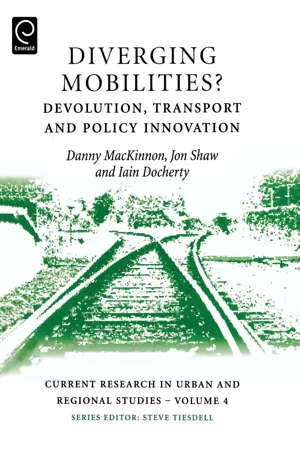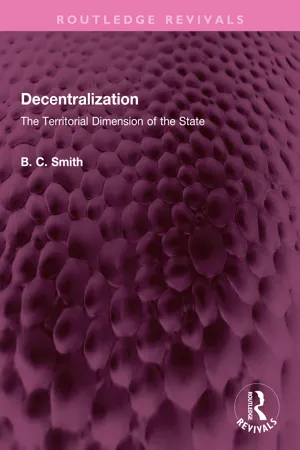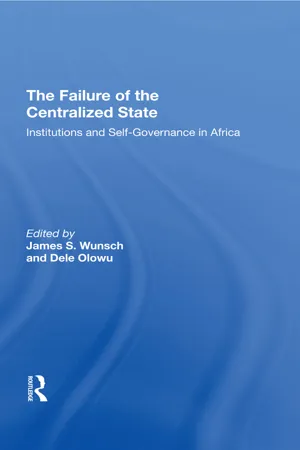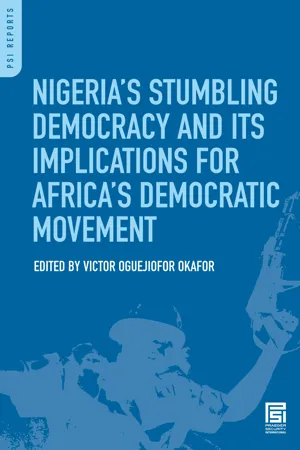Geography
Devolution in Nigeria
Devolution in Nigeria refers to the transfer of political power and decision-making authority from the central government to regional or local governments. This process aims to decentralize governance, promote local autonomy, and address the diverse needs of Nigeria's various regions. Devolution is intended to enhance regional development, improve service delivery, and foster greater participation in governance at the local level.
Written by Perlego with AI-assistance
Related key terms
1 of 5
4 Key excerpts on "Devolution in Nigeria"
- eBook - PDF
Diverging Mobilities
Devolution, Transport and Policy Innovation
- Danny MacKinnon, Jon Shaw, Iain Docherty, Danny MacKinnon, Jon Shaw, Iain Docherty, Steven Tiesdell(Authors)
- 2008(Publication Date)
- Elsevier Science Ltd(Publisher)
As Salmon and Keating (2001) observe, much of the debate about the transformation of the state has been conducted at a general, abstract level rather than offering detailed examinations of change in particular places. One of the most concrete and tangible processes in this respect is devolution. Since the 1970s, many unitary states across the world have introduced some degree of devolution, strengthening the regional scale of government ( Rodriguez-Pose & Gill, 2003 ). This has produced an assortment of institutional arrangements, stretching from the strong regionalism of Spain to the functional (administrative) regionalism found in Portugal or Sweden ( Keating, 1998 ). From the perspective of the central state, devolution can be seen as part of a broader process of territorial management, designed to meet the two underlying territorial objectives of the state: ‘‘preserv[ing] the integrity of the territory, and ensur[ing] legitimacy within these boundaries through popular support for and acquiescence to its political authority’’ ( Rokkan & Urwin, 1983, p. 166 ). It is instructive to note, however, that the introduction of political decentralisation has often not been enough to settle debates over devolution and regionalism, sometimes leading to further stages of reform. Whilst the observation that devolution is a process not an event has become something of a cliche´ in the context of British devolution ( Davies, 1999 ), the adoption of a broader international perspective serves to emphasise its underlying validity ( Hazell, 2001 ). The purpose of this chapter is to place our study of transport policy in the UK within the broader context of the literature on devolution and state restructuring, outlining the theoretical perspectives that inform the book and reviewing the process of devolution in other states. - eBook - ePub
Decentralization
The Territorial Dimension of the State
- Brian C. Smith(Author)
- 2023(Publication Date)
- Routledge(Publisher)
1Introduction to a ConceptDOI: 10.4324/9781003404927-1Lexicographically, decentralization means both reversing the concentration of administration at a single centre and conferring powers of local government. The dictionary thus captures the idea of decentralization as a political phenomenon involving both administration and government. Decentralization involves the delegation of power to lower levels in a territorial hierarchy, whether the hierarchy is one of governments within a state or offices within a large-scale organization. Decentralization may be clearly distinguished from the dispersal of the headquarters’ branches from the capital city, as when part of a national ministry is moved to a provincial city to provide employment there. It may also be distinguished from delegation, when a superior entrusts a subordinate with some of the former’s responsibilities, though decentralization will involve delegation when the subordinate, whether it be an individual bureaucrat or an elected assembly, takes part responsibility for a designated area within the territorial jurisdiction of the organization or state concerned.In the study of politics decentralization refers to the territorial distribution of power. It is concerned with the extent to which power and authority are dispersed through the geographical hierarchy of the state, and the institutions and processes through which such dispersal occurs. Decentralization entails the subdivision of the state’s territory into smaller areas and the creation of political and administrative institutions in those areas. Some of the institutions so created may themselves find it necessary to practise further decentralization.One focus of attention is therefore on the major subdivisions of the unitary state: the counties and districts of England and Wales, or the départements - eBook - ePub
The Failure Of The Centralized State
Institutions And Selfgovernance In Africa
- James Wunsch, Dele Olowu, John W Harbeson, Vincent Ostrom(Authors)
- 2019(Publication Date)
- Routledge(Publisher)
9Centralization, Self-Governance, and Development in NigeriaDele OlowuIntroduction
Nigeria, by virtue of her history, size, political culture and the style of her economic development policies, occupies a unique position in Africa. With a population equal to about a fifth of the continent, she has served since her independence in 1960 as Africa’s major experiment in operating a federal polity. Even the military, which has ruled the country for more than half of the period since independence, has had to concede aspects of this federalist political structure as well as the country’s commitment to popular government and the rule of law. Economically, in spite of growing state interventionism since the late 1960s, the private sector has remained the prime mover of economic growth, not only in traditional agriculture but also in such modern sectors as construction, transportation and commerce.These economic and political values: federalism, democracy, and a tolerably open economy, are products of Nigeria’s unique pre-colonial and colonial history as well as the size and diversity of her peoples. A major theme in this book concerns the progressive centralization of political power in African countries and the consequences such a political strategy has created in social and economic realms. This Nigerian case-study is particularly appropriate from this viewpoint in that it dramatizes very clearly how political and economic values shared widely by the country’s leadership (and to some extent her people) and the accompanying institutions to which they gave rise in the pre-independence and the immediate post-independence period in 1960, were transformed into more centralized values and institutions by another leadership group. The tension between political realities and the choice of political strategy in the post-independence period has been great, leading to severe economic and political problems. I shall try to demonstrate in this chapter how this situation emerged and the nature of the tensions created, and I will suggest by way of conclusion how the present tension may be eased. - Victor Oguejiofor Okafor(Author)
- 2008(Publication Date)
- Praeger(Publisher)
6 In the period before the arrival of the British, these many nationalities that were living within the territory that is now Nigeria had interacted economically and socially with their neighbors as well as with other peoples now resident out- side the federation. The concept of geographical zoning as a tool for political stability arose in the historical process of the development of a viable constitution for Nigeria. The real cause of the origin and development of this concept rests on a combination of factors, the main ones being: • the concentration of political influence and power in the three largest nationalities • the internecine and sustained struggle for overall control of power among the politicians who are dedicated to the political interests of these three major nationalities • the emergence of very influential political parties mainly dedicated to the political interests of the three largest nationalities • the nearly total dependence of the articulate members of the smaller nationalities on the three political parties of the three largest nationali- ties for political expression, thereby shrinking their nationality’s influ- ence on the emerging political and constitutional structures before independence THE ROLE OF GEOGRAPHICAL ZONING IN NIGERIA ’S DEMOCRACY 99 • the failure of the dominant political parties to evolve a national program for the overall development of Nigeria • the utilization of political power for personal self-enrichment at the expense of the peoples of Nigeria • the expanding resources of the country in the midst of pervading poverty among the population In this work, the phrase geographical zoning has the same meaning as federal character, which is the term that is used in the constitution of the Federal Republic of Nigeria, generally called the 1999 Constitution. This constitution is at present in use in Nigeria. The terms are also used to mean quota system, a term that is preferred by a substantial number of commentators.
Index pages curate the most relevant extracts from our library of academic textbooks. They’ve been created using an in-house natural language model (NLM), each adding context and meaning to key research topics.



